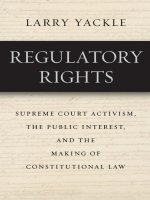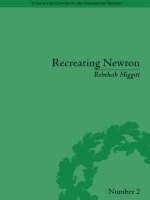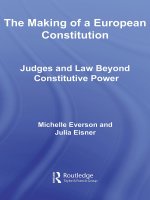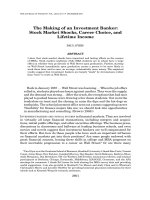The opium war drugs, dreams and the making of modern china
Bạn đang xem bản rút gọn của tài liệu. Xem và tải ngay bản đầy đủ của tài liệu tại đây (2.56 MB, 448 trang )
Tai Lieu Chat Luong
ToRob
Preface
On8November2010,theBritishprimeminister,DavidCameron,leda
substantialembassytoChina.Hewasaccompaniedbyfourofhismostsenior
ministers,andfiftyorsohigh-rankingexecutives,allhopingtosignmillionsof
pounds’worthofbusinessdealswithChina(forproductsrangingfromwhisky
tojets,frompigstosewage-stabilizationservices).Toanyonefamiliarwiththe
historyofSino-Britishrelations,theenterprisewouldhavebroughtbacksome
unhappymemories.Britain’sfirsttwotrade-hungrymissionstoChina(in1793
and1816)endedinconflictandfrustrationwhentheirambassadors–proud
Britons,both–declinedtoprostratethemselvesbeforetheQingemperor.These
failuresledindirectlytodecadesofintermittentwarsbetweenthetwocountries,
asBritainabandonednegotiationandresortedinsteadtogunboatdiplomacyto
openChinesemarketstoitsgoods–chiefamongwhichwasopium.
DespitehappysnapsofDavidCameronsmilingandwalkingalongtheGreat
Wallinthecompanyofschoolchildren,the2010visitwasnotwithoutits
difficulties.On9November,asCameronandcompanyarrivedtoattendtheir
officialwelcomingceremonyattheGreatHallofthePeopleatTiananmen
Square,aChineseofficialallegedlyaskedthemtoremovetheirRemembrance
Daypoppies,onthegroundsthattheflowersevokedpainfulmemoriesofthe
OpiumWarfoughtbetweenBritainandChinafrom1839to1842.
SomeoneinChina’sofficialwelcomingpartyhad,itseemed,putconsiderable
effortintofeelingoffendedonbehalfofhisorher1.3billioncountrymen(for
onething,RemembranceDaypoppiesareclearlymodelledonfield,notopium,
poppies).PartsoftheChineseInternet–which,sinceitcameintoexistence
somefifteenyearsago,hasbeenhometoanoversensitivenationalism–
respondedangrily.‘Asrulersofthegreatestempireinhumanhistory,’
rememberedonenetizen,‘theBritishwereinvolvedin,orsetoff,agreatmany
immoralwars,suchastheOpiumWarsthatweChinesearesofamiliarwith.’
‘WhosefaceistheEnglishprimeministerslapping,whenheinsistssoloftilyon
wearinghispoppy?’askedoneblogger.‘HowdidtheEnglishinvadeChina?
Withopium.HowdidtheEnglishbecomerichandstrong?Throughopium.’
InBritain,meanwhile,theincidentwasquicklyspuntothecreditofthe
country’sleadership:oursteadfastministers,itwasreported,hadrefusedtobow
totheChineserequest.‘Weinformedthemthepoppiesmeantagreatdealtous,’
saidamemberofthePrimeMinister’sparty,‘andwewouldbewearingthemall
thesame.’(Inrecentyears,RemembranceDayactivitieshavebecomeinfected
bypoliticalhumbug,asright-wingragslambastpublicfigurescaughtwithout
poppiesintheirlapels.InNovember2009,thethen-oppositionleader,David
Cameron,andthePrimeMinister,GordonBrown,usedthecommemorationto
engageinPRbrinkmanship,bothvyingtobephotographedlayingwreathsfor
thewardead.)IncertainquartersoftheBritishpress,theincidentwasreadasan
echoofthe1793and1816stand-offs,withpluckylittleBritainagainrefusingto
kowtowtotheimperiousdemandsoftheChinesegiant.
Behindallthis,however,reactionstotheincidentweremorenuanced.For
onething,beneaththestirringBritishheadlinesof‘DavidCameronrejects
Chinesecalltoremove“offensive”poppies’,itprovedhardtosubstantiatewho,
exactly,intheChinesegovernmenthadobjected.Beyondtheoccasional
expressionofoutrage,asintheexamplesabove,theChinesecyber-sphereand
pressdidnotactuallyseemparticularlybothered,withnetizensandjournalists
calmlydiscussingthesymbolicsignificanceofBritishpoppy-wearing,andeven
bemoaningthefactthatChinalackedsimilarcommemorationsofherwardead.
ThewiderpublicresponseinBritainalsoappearedrestrained.Readercomments
oncoverageoftheincidentinBritain’snormallyjingoisticDailyMailwere
capableofempathyandeventouchesofguilt.‘Justbecause[poppy-wearing]is
importantinBritaindoesn’tmeanitmeansthesametheworldover.I’msure
someofusinBritainarehighlyignorantoftheimportanceofChinesehistoryin
China–especially...theOpiumWar...nowondertheyareabitsensitive
aboutit’.
DavidCameron’spoppycontroversywasonlythemostrecentexampleofthe
antagonisms,misunderstandingsanddistortionsthattheOpiumWarhas
generatedoverthepasthundredandseventyyears.Sinceitwasfought,
politicians,soldiers,missionaries,writersanddrugsmugglersinsideandoutside
Chinahavebeenretellingandreinterpretingtheconflicttoservetheirown
purposes.InChina,ithasbeenpubliclydemonizedasthefirstemblematicactof
Westernaggression:asthebeginningofanationalstruggleagainstaforeign
conspiracytohumiliatethecountrywithdrugsandviolence.Innationslike
Britain,meanwhile,thewagingofthewartransformedprevailingperceptionsof
theMiddleKingdom:Chinabecame,inWesterneyes,anarrogant,fossilized
empirecastbeneficiallyintothemodernworldbygunboatdiplomacy.The
realityoftheconflict–atragicomedyofoverworkedemperors,mendacious
realityoftheconflict–atragicomedyofoverworkedemperors,mendacious
generalsandpragmaticcollaborators–wasfarmorechaoticallyinteresting.This
bookisthestoryoftheextraordinarywarthathasbeenhauntingSino-Western
relationsforalmosttwocenturies.
Contents
Maps
ANoteAboutChineseNamesandRomanization
Introduction
One:OpiumandChina
Two:Daoguang’sDecision
Three:CantonSpring
Four:OpiumandLime
Five:TheFirstShots
Six:‘AnExplanatoryDeclaration’
Seven:Sweet-TalkandSea-Slug
Eight:Qishan’sDownfall
Nine:TheSiegeofCanton
Ten:TheUnEnglishedEnglishman
Eleven:XiamenandZhoushan
Twelve:AWinterinSuzhou
Thirteen:TheFightforQingChina
Fourteen:TheTreatyofNanjing
Fifteen:PeaceandWar
Sixteen:TheYellowPeril
Seventeen:TheNationalDisease
Eighteen:CommunistConspiracies
Nineteen:Conclusion
PrincipalCharacters
Timeline
Notes
SelectedBibliography
Acknowledgements
Index
Maps
1.TheContemporaryPeople’sRepublicofChina
2.TheQingEmpire
3.OverviewofTheatresoftheOpiumWar,1839–42
4.CantonanditsSurroundings
5.TheEastCoastCampaigns(1841–42)
TheContemporaryPeople’sRepublicofChina
TheQingEmpire
OverviewofTheatresoftheOpiumWar,1839–42
CantonanditsSurroundings
TheEastCoastCampaigns(1841–42)
ANoteAboutChineseNamesandRomanizationIn
Chinesenames,thesurnameisgivenfirst,followedby
thegivenname.Therefore,inthecaseofLiangQichao,
LiangisthesurnameandQichaothegivenname.
Ihaveusedthepinyinsystemofromanizationthroughout,exceptforafew
spellingsbestknownoutsideChinainanotherform,suchasChiangKai-shek
(JiangJieshiinpinyin).Inaddition,Ihaveoccasionallyusedtheold,nineteenthcenturyanglophonespellingsofsomeChineseplacenames(forexample
Canton,forthecityknowninMandarinChineseasGuangzhou)toreduce
confusionresultingfrommorethanonenamebeingcitedinthemaintextandin
quotationsfromprimarysources,andalsobecauseanglophonehistoriansstill
callthepre-1839rulesgoverningEuropeantradewithChina‘theCanton
system’.
Inpinyin,transliteratedChineseispronouncedasinEnglish,apartfromthe
followingsounds:VOWELS
a(whentheonlyletterfollowingaconsonant):aasinahai:eye
ao:owasinhowe:uh
ei:ayasinsayen:enasinhappeneng:ungasinsungi(astheonlyletter
followingmostconsonants):easinmei(whenfollowingc,ch,s,sh,z,zh):er
asindriveria:yah
ian:yen
ie:yeah
iu:yoasinyo-yoo:oasinstorkong:oong
ou:oasinsou(whenfollowingmostconsonants):ooasinlootu(when
followingj,q,x,y):üastheGermanüua:wah
uai:why
uan:wu-an
uang:wu-ang
ui:way
uo:u-woah
yan:yen
yi:eeasinfeed
CONSONANTS
c:tsasinbitsg:gasingoodq:chasinchoosex:aslightlymoresibilant
versionofshasinsheepz:dsasinwoodszh:jasinjob
Introduction
In1832,alordoftheKing’sbedchamberbythenameofWilliamNapierlosthis
seatasaScottishpeerandstartedlookingforgainfulemployment.Withina
year,somethinghadcomeup:SuperintendentofBritishtradeinChina–anew
governmentposition(atanattractive,ambassadorial-level£6,000perannum)to
replacetheoldSelectCommitteeoftheEastIndiaCompany,whosemonopoly
overtheChinatradehadjustbeenabolished.ThoughNapierimmediatelymade
aplayforthepost,thePrimeMinister,LordGrey,stalledhimonthegrounds
thatheneededCabinetapproval.Foronpaper,Napierwasnotthestrongestof
applicants.Hewasamanofmanytalents:navigation;sheep-farming(onwhich
subjecthewasapublishedauthority);bagpipe-mending;playingtheflute.
Unpickingdelicatediplomaticwrangleswithoneofthelargestandmost
intricatelyculturedempiresintheworldwasnot,however,partofhisskill-set.
YetGreywasnotoverwhelmedbymoresuitablecandidates.Theposthad
alreadybeenturneddownbyacolonialstalwartandfutureGovernorofIndia,
LordAuckland,whohadnamedCanton–thesoutherncityinGuandong
provincetowhichEuropeantradershadbeenrestrictedsince1760–‘perhaps
theleastpleasantresidenceforaEuropeanonthefaceoftheearth’.1Britain’s
relationshipwithChina’scurrentoverlords,theManchuQingdynasty,should
havebeenstraightforward.Britainwantedtea,andotherdesirablessuchassilk
andporcelain;theQingwerehappytosell.Thetradewasthoroughlyregulated.
Thedynasty’sfourthemperor,Qianlong,hadin1760limitedforeigncommerce
toamonopolisticCantonguildofmerchantsknowntoEuropeansasthe‘Hong’
(Cantoneseforcompany):purchasesandsales,transittaxes,complaints,customs
tariffs–everythingwastogofirstthroughtheHong,whomightpass
outstandingqueriesontothelocalofficialinchargeoftrade.Hemight,inturn,
forwardmattersontotheprovincialgovernor;andfromthere,eventually,they
mightmoveontotheemperorinBeijing.Ratherthanputthemselvestothe
troubleoffindinglodgingsandwarehousesinthecityofCantonitself,China’s
governmentruledthatEuropeantradersweretomakethemselvesathome
throughthetradingseason(roughlySeptembertoJanuary)inarowof‘factories’
leasedtothembytheHong.SituateddeliberatelyoutsideCanton’sthirty-foothighcitywalls,thefactoriesofferedmerchantsaroundfifteenacresoflivingand
warehousespace,overlookingthePearlRiverthatleduptothecityfromthesea.
Outsidethesemonths,theforeignersweretowithdrawtothePortuguese-leased
enclaveofMacao,aboutseventymilesaway,orreturnhome.TheEuropeans,in
sum,wereatalltimestobekeptatacareful,bureaucraticdistancefromthe
authoritiesandpopulace.
ButifrelationsbetweentheChinesegovernmentandforeignmerchantswere
wary,thetruesourceofbadfeelingwasnotbureaucracy–itwaseconomics.By
the1780s,Britainwasrunningupaserioustradedeficit:whileChina’s
governmentwasquitehappytoservicethegrowingBritishteaaddiction,it
seemedtowantlittleexceptsilverinreturn.AsEastIndiaCompanyprofits
failedtooffsetthecostsofruleinIndia,Britishtea-drinkerspushedAsiatrade
figuresfurtherintothered.From1780to1790,thecombinedreturnsofthe
IndiaandChinatradesfailedtomakeevena£2milliondentinthe£28million
debtleftoverfromtheconquestofIndia.2
Bythe1820s,theBritishthoughttheyhadfoundaperfectsolutiontotheir
difficulty:Indianopium,forwhichChineseconsumershadincreasingly
developedatasteovertheprecedingcoupleofdecades.Between1752and1800,
anet105millionsilverdollars(approximately£26.25million)flowedinto
China;between1808and1856,384milliontravelledintheoppositedirection,
thebalanceapparentlytippedbyboomingopiumimports.From1800to1818,
theaverageannualtrafficheldsteadyataround4,000chests(eachchest
containingaround140poundsofopium);by1831,itwasnearing20,000.After
1833,whentheFreeTradelobbyterminatedtheEastIndiaCompany’s
monopolyontheteatrade,themarketwasfloodedbyprivatemerchantshungry
forteaandprofits.Opium–inevergreaterquantities–wasthebarter.Bythe
closeofthedecade,saleshadmorethandoubledagain.3
ThegreaterpartoftheprofitsfellintothepocketsoftheBritishgovernment,
whoseagentsinAsiacontrolledopiumproductioninBengal.TheEastIndia
CompanydidnotpubliclydirtyitshandsbybringingthedrugtoChina.It
commissionedandmanagedplantationsofopiumpoppiesacrosshundredsof
thousandsofIndianacres.Ittookcareoftheprocessing(thepainstakinglancing
ofindividualpoppyseedpodsforrawopiumgum,settinganddryingthegumin
trays,pressingitintocakes,andcoatingtheseincrushed,driedpoppystemsand
trays,pressingitintocakes,andcoatingtheseincrushed,driedpoppystemsand
leaves).Finally,itoversawthepackingofthedrugintomango-woodchests,its
shippingtoCalcutta,andauctioningoff.Atthatmoment,theCompanywashed
itshandsofit,lettingprivatemerchantssailfortheChinesecoast,wherethey
anchoredofftheislandofLintin,atthemouthofthePearlRiver.EagerChinese
wholesalerswouldthenusesilvertobuycertificatesfromprivatetradingoffices
inCantonandexchangethemforopium;thissilverwouldinturnsecureteasand
silksfortheEnglishmarket.
Onthefaceofit,thearrangementwasastidyastheearliersilver–teatrade:
onesidehavingsomethingtosell,theotherhavingsomethingitwantedin
exchange.ButanxiousmembersoftheQinggovernmentwerenohappiertolose
silverthantheirBritishcounterpartshadbeenafewdecadesearlier,andwere
frettingaboutthecorruptingeffectsofaboomingdrugculture.Afterahandful
ofattemptedcrackdownsintheeighteenthcentury,theQingstate’swaron
opiumbeganinearnestinthe1830s,andwouldcontinue–intermittently,
inconsistently–overthenexthundredyears.Britain’sprivateopium-sellers
werealsodissatisfied.ForIndiacouldprovideasmuchopiumasChinawould
takeandtheyresentedthefactthattheQing’stradecontrolshadpushedthem
intotheblackeconomy.Theycravedamorerespectableimage,toestablish
commerceonafooting‘equallyadvantageousandhonourable’,andwanteda
lawfulwayintotheChinamarket,eitherthroughthelegalizationofopium,or
throughtheopeningofportstootherBritishgoods–andpreferablyboth,to
whichendtheybegan,throughthe1830s,impudentlyedgingthetradefurther
northupthecoast.4
Thesemerchantswereforthemostpartacrewofbuccaneeringmoneymakers,fullofmockeryfortheempireoutsidewhosewallstheywereheld(orat
anyratefortheunrepresentativesouthernfragmentthattheyglimpsedat
Canton).Theyobjectedtowhattheysawasitspompous,oftenvenal
bureaucracy;itsdeterminationtokeepthemandtheirtradeataprudentremove;
itsantiquity,itssmells,itsabsenceofChristianityanddecentwater-closets;the
offensiveChinesehabitofstaringatforeigners;thearrogantChinesefailureto
stareatforeigners;andsoon.TheChinese,assummarizedbyJamesMatheson,
aScottishpillarofthesmugglingcommunityandco-founderwithWilliam
JardineofthegreatopiumhouseJardine–Mathesons,were‘apeople
characterizedbyamarvellousdegreeofimbecility,avarice,conceitand
obstinacy...Ithasbeenthepolicyofthisextraordinarypeopletoshroud
themselvesandallbelongingtotheminmysteryimpenetrable...[to]exhibita
spiritofexclusivenessonagrandscale.’5
MathesonandhiscolleagueswerejoinedintheirimpatiencebytheProtestant
missionarycommunity.TheLondonMissionarySocietyhadsentouttheirfirst
mantosouthChina,RobertMorrison,in1807.Notlongafterhisarrival,hehad
beenaskedwhetherhehopedtohaveanyspiritualimpactonthecountry:‘No,’
heresponded,‘butIexpectGodwill’.6Thirtyyearslater,heandhiscolleagues
foundthemselvesunableeithertonameorenumeratemorethanahandfulof
converts.Ill,depressed,stalledontheedgeofthemainland,frustrated
missionaryobserversofthe1830sspokeapuredialectofimperialist
paternalism:‘Chinastillproclaimsherproudandunapproachablesupremacy
anddisdainfullyrejectsallpretensionsinanyothernationtobeconsideredas
herequal.ThisfeelingofcontemptiblevanityChristianityalonewilleffectually
destroy.Whereothermeanshavefailed,thegospelwilltriumph;thiswill
fraternizetheChinesewiththerestofmankind...[linking]theminsympathy
withotherportionsoftheirspecies,andthusaddtothetriumphsithas
achieved.’7Themissionariesbecamenaturalalliesofthesmugglers:whenthey
firstarrivedonthecoastofChina,theydockedamongopiumtradersonthe
islandofLintin;theyinterpretedfortheminexchangeforpassagesupthecoast,
distributingtractswhilethedrugwastakenonshore;andintheChinese
Repository,Canton’sleadingEnglish-languagepublication,theysharedaforum
forspreadingtheirviewsontheurgentneedtoopenChina,bywhatevermeans
necessary.Bythe1830s,merchantsandmissionariesalikefavouredviolence.
‘[W]henanopponentsupportshisargumentwithphysicalforce,[theChinese]
canbecrouching,gentle,andevenkind’,observedKarlGützlaff,astout
Pomeranianmissionarywhowould,duringtheOpiumWar,leadtheBritish
militaryoccupationofpartsofeasternChina,runningarmiesofChinesespies
andcollaborators.8Theslightestprovocationwoulddo.In1831,tradershad
writtentothegovernmentinIndia,demandingafleetofwarshipstoavengethe
Chineseauthorities’partialdemolitionofafrontgardenthattheBritishhad
illegallyrequisitioned.9
TheappointmentNapiersoughtwastooverseethisuntidy,thoughbroadly
profitablemodusvivendi.Hisbriefwastomaintainalegalteatradefinancedby
illegaldrugimports.Eventually,afteraskingthekingtointerveneonhisbehalf,
NapierwonBritain’sfirstofficialresidentpostingtoChina.Thenew
superintendenthadasimplesolutiontothedifficultiesbeforehim:blastthe
countryintosubmission.‘TheEmpireofChinaismyown’,heconfided
excitedlytohisdiary.‘Whatagloriousthingitwdbetohaveablockading
squadronontheCoastoftheCelestialEmpire...howeasilyagunbrigwdraise
arevolutionandcausethemtoopentheirportstothetradingworld.Ishouldlike
tobethemediumofsuchachange.’10
Greytookcaretoputhimrightinaprivateletterofinstructions:‘Nothing
mustbedonetoshock[Chinese]prejudices&excitetheirfears...Persuasion&
Con-ciliationshouldbethemeansemployed,ratherthananythingapproaching
tothetoneofhostile&menacinglanguage’.11Thewarningfellondeafears.In
thecourseofhissix-monthseavoyagetoChina,Napierdrewthefollowing
conclusions:first,thatthekeytoBritishinterestinChinawastea,andsecond,
that‘everyactofviolenceonourparthasbeenproductiveofinstantredressand
otherbeneficialresults’.12TheBritish‘mustuseforce,notmenaceit’,he
remindedhimself,somewherepastMadeira.13Therewillcomeatime,Napier
resolvedashisshipcrossedthetropicseas,whentheirfollywill‘bringdown
uponthemthechastisementofGreatBritain,wheneverypointmaybegained
withthegreatestease,andsecuredforalltimetocome’.14
BurntrawbythesouthChinasun,NapiersailedintoCantonat2a.m.on25
July1834;bydaybreak,theUnionflagwasflyinghighovertheoldEastIndia
Companyfactory.WithintwodayshehadsucceededinbreakingsixlongestablishedrulesofAnglo-Chinesetrade.Chiefamongtheseoffenceswerethat
hehadsailedintoCantonwithoutapassport,andwithoutapermittotakeup
residencethere,andthathetriedtocommunicateinwritingdirectlywith
officials–therebyassertinghisdiplomaticequality–ratherthanthroughthe
merchantsimperiallyappointedtodealwithforeigners.
Napier’sdisregardfortherulesdidnotendearhimtothegovernor-general
responsibleforCanton,LuKun,whobegantryingtoedgehimbackintoline,
instructinghimtoretreattoMacaoandnotreturnwithoutapermit.Irritatedby
allthisdiplomaticfuss(Napier’sdeterminationtohandaletterofselfintroductiondirectlytothegovernor-generalhadembroiledEnglishandChinese
underlingsinathree-hourstand-offatthecitygateunderthemiddaysun),the
Chineseadministrationalloweditselfalittlelinguisticmischief.Inpublicedicts,
Napier’snameappearedincharactersthat,theBritishtranslatorawkwardly
explained,seemedtomean‘laboriouslyvile’.Inreturn,Napiernamedthe
governor-general‘apresumptuoussavage’,mutinouslydistributedChineselanguagebroadsheetsenumeratingthelocalgovernment’ssins,andsworeto
punishtheinsulttotheBritishcrown:‘Threeorfourfrigatesandbrigs,’he
quicklywrotetohisforeignsecretary,LordPalmerston,‘withafewsteady
Britishtroops...wouldsettlethethinginaspaceoftimeinconceivablyshort.
SuchanundertakingwouldbeworthythegreatnessandthepowerofEngland..
.theexploitistobeperformedwithafacilityunknowneveninthecaptureofa
paltryWestIndiaIsland’.15
GivenhisirascibilitytowardstheChineseauthorities,Napierdevelopeda
surprisingtendernessfortheChinesepeoplethemselves.‘Inevermetwithmore
civility,’heremarkedsomethreeweeksintohisstay,‘orsolittleofadisposition
toactwithinsultorrudenessthanIconstantlyseeamongthesehardworkingand
industriouspeople.’16Hebecameconvincedthattheylookedtohimfor
liberationfromChina’soppressiveauthorities.‘[S]aytotheEmperor–adopt
thisorabidetheconsequences–anditisdone...Ianticipatenotthelossofa
singlesoul,andwehavejusticeonourside...TheChinesearemostanxiousto
tradewithus.’ProvideditwaskeptsufficientlyinformedoftheBritish
grievance,hereasoned,thepopulace‘mightlooktothearrivalofsuchaforceas
thehappymeansoftheiremancipationfromamostarbitrarysystemof
oppression...surelyitwouldbeanactofCharitytotakethemintoone’shands
altogether,andnodifficultjob.’17
By2September1834,Napier’sdefiancehaddrivenLuKuntostoptradeand
blockadetheBritishfactory.Withinanotherweek,ithadprovokedarmed
conflict.AfterdispatchingarequesttoLordGreyforaBritishforcefromIndia,
Napiercalledthetwofrigatesunderhiscommand(stationedalongthecoast)up
rivertowardsCanton,expectingtofrightenhisadversaryintosubmission.The
Chinesewerenotsoeasilyintimidated,however.Thefortsatthemouthofthe
riverexchangedfirewiththefrigates,killingatleasttwoBritishsailorsand
injuringothers.LuKunhad,moreover,orderedaseriesofboatstobesunk
behindthefrigates,whichthen(toobigtoadvancefurther,theirwayback
blocked)foundthemselvesstranded.Nowsickeningbadlyfrommalaria,Napier
wasforcedtoabandontheBritishfactoryandCanton.Onhiswaybackdownto
thecoast,NapierwasleftfloatingforaweekinthePearlRiverbyvengeful
Cantonesebureaucrats,untilthefrigateswereconfirmedashavingreturnedto
theocean.Weakenedbythedelayonboard,afteranothertwoweekshediedof
feverinMacao.
NevermindthatplentyofBritishonlookersthoughtNapierfoolishlyviolent
andprecipitate,thattradeshouldbewonbypeaceandnotwar.(TheBritish
were,thesinophoneMPforHampshireGeorgeStauntonargued,‘inanational
pointofview,totallyandentirelyinthewrong’.18)Nevermind,either,that
Napierhadbrokenruleuponrule,andignoredthegreaterpartofhisofficial
instructions.Or,again,thatuntilLuKunthreatenedtobeheadhimforspreading
seditiousnoticesabouttheQinggovernment,theCantoneseauthoritieshad
resistedhimpeaceablyenough.(‘SupposeaChinaman’,Napierhimselfwroteto
Palmerstonconcerninghislack-of-passportcontroversy,‘weretolandunder
similarcircumstancesatWhitehall,yourLordshipwouldnotallowhimto
“loiter”astheyhavepermittedme.’19)Britainhadnowbeenoffereditsfirst
decentpretextforopenconflictwithChina,shoulditbeofamindtomakeuse
ofit:theemperor’smaninCantonhadmenacedthelifeoftheking’smanin
Canton;Britishlife,libertyandpropertyhadbeeninsultedandlost–insultsthat
Britishhawksnowinsistedcouldonlybeavengedbyanarmedresponse.
Despitehismanydiplomaticfailures(anddeath),then,Napiersucceeded
superblyintworespects:first,inmovingAnglo-Chineserelationsclosertowards
thepossibilityofarmedconflict,asrelativelypeacefulpragmatismwasousted
byeconomicself-interestandpompousnationalprinciple;andsecond,in
recastingtheBritishimpulsetowardswarasamoralobligation,an‘actof
Charity’towardstheChinesethatwouldsowonlyfriendshipforBritish
gunboats.AlthoughtheadvocatesofwarwouldnotwinoverBritain’sdecisionmakersuntil1839,theirdenunciationsofinsufferableChinesearrogancewere
busilyworkingonBritishpublicopinionintheinterim.Constructedaroundthe
timeoftheOpiumWartojustifyviolenceagainstChina(thehostileChinese,the
argumentwent,haveforcedustodefendourselves),thisstereotypeofthe
obtuselyanti-foreignChinesewouldhauntWesternattitudestotheempire
throughthenineteenthandtwentiethcenturies.20China,declaredtheChinese
Repositoryinthelastdaysof1836,was‘anationnursingitselfinsolitary,sulky
grandeur,andtreatingasinferiorallothernations,mostfarsuperiorin
civilization,resources,courage,artsandarms...Itseemsindeedstrangethat
thewholefabricoftheChineseEmpiredoesnotfallasunderofitself’.One
‘vigorousandwelldirectedblowfromaforeignpower’,and‘itwilltottertoits
base’.21
In1839,theBritishgovernmentresolvedtoadministerthatblow,afterthe
QinggovernmentrefusedBritishsmugglersfood,waterandtradeuntilthey
promisedtostophaulingtheirshipfulsofopiumintoChina,andCanton’s
merchantlobbyboredownonForeignSecretaryPalmerstontointervene.On18
October,PalmerstoninformedhismaninChina,CaptainCharlesElliot,thata
fleetwouldreachChinathefollowingyeartofighttheQing.‘Alltheworldmust
rejoicethatsuchaforceishere’,crowedtheChineseRepositoryfromsouth
China,watchingtheexpedition’sshipssailoffinlateJune1840intotheirfirst
warwithChina.22
InChinatoday,theOpiumWaristhetraumaticinaugurationofthecountry’s
modernhistory.Historybooks,televisiondocumentariesandmuseumschorusa
simple,receivedwisdomabouttheconflict,whichgoessomethinglikethis.In
theearlynineteenthcentury,unscrupulousBritishtradersbeganforcing
enormousquantitiesofIndianopiumonChineseconsumers.WhentheChinese
governmentdeclaredwaronopium,inordertoavertthemoral,physicaland
financialdisasterthreatenedbytheempire’sgrowingdrughabit,British
warshipsbulliedChinaoutoftensofmillionsofdollars,anditseconomicand
politicalindependence.Gunboatdiplomacy,opiumandthefirst‘Unequal
Treaty’of1842(followedbyasecondin1860,concludingthe‘secondOpium
War’begunin1856)broughtChina–untiltheendoftheeighteenthcentury,
probablytherichestandmostpowerfulcivilizationintheworld–toitsknees,
leavingitspeopleslavishaddicts,incapableofresistingsubsequentwavesof
European,AmericanandJapanesecolonizers.23ThisaccountoftheOpiumWar
isnowoneofthefoundingmythsofChinesenationalism:thefirstgreatcallto
armsagainstabullyingWest;butalsothestartofChina’s‘centuryof
humiliation’(ausefulpedagogicalshorthandforeverythingthathappenedin
Chinabetween1842and1949)atthehandsofimperialism.24Itmarksthe
beginningofChina’sstruggletofreeitselffrom‘semi-colonialsemi-feudalism’
(Mao’sownsummaryofthecenturyofChineseexperienceafter1842),andto
‘standup’(Maoagain)asastrongmodernnation–abattlethatends,naturally,
withCommunisttriumphin1949.‘ThestoryofChina’smodernhistory[from
theOpiumWartothepresentday]’,summarizesa2007historytextbookinuse
inoneofChina’seliteinstitutionsofhighereducation,BeijingUniversity,
isthehistoryofthecourageousstrugglebythegood-heartedmassesfornationalsurvivalandto
accomplishthegreatrevivaloftheChineserace.Itisthehistoryofeverynationalityinthecountry,
undertheleadershipoftheChineseCommunistParty,undertakingagreatandpainfulstruggletowin
nationalindependenceandliberationthroughthe1949Revolution;itisthehistoryofanextremely
weak,impoverishedandoldChinagraduallygrowing,thankstothesocialistrevolution...intoa
prosperous,flourishingandvitalnewsocialistChina...Whataretheaimsofstudyingourmodern
history?...TogaindeepinsightintohowHistoryandthePeoplecametochooseMarxism,cameto
choosetheChineseCommunistPartyandcametochoosesocialism.25
AstherulersofthecontemporaryPeople’sRepublicswingbetweenselfconfidenceaboutitsmiracleriseandsuspicionofaWestsupposedlydetermined
tocontainit,theOpiumWariskeptatthefrontofnationalmemory.Particularly
sincethe1990s,whentheCommunistPartybeganrallyinganti-foreign
nationalismtoshoreupitsownlegitimacyaftertheTiananmencrackdown,the
OpiumWarhasbeencalledintoserviceinsuccessive‘patrioticeducation’
campaignswagedonmonumentsandintextbooks,newspapersandfilms.26
WiththeturmoiloftheTiananmenuprisingof1989blamedon‘Western
bourgeoisliberalization’,thehundredandfiftiethanniversaryofthefirstOpium
Warin1990offeredapublicrelationsgifttothegovernment,theopportunityto
splashstirringeditorialsacrossthemediaaboutthis‘nationaltragedy’inflicted
bythegunboatsoftheWest.27‘Inordertoprotectitsevilopiumtrade,’the
People’sDaily(theCommunistParty’sofficialnewsorgan)remindedits
readers,
theBritishgovernmentpoisonedtheChinesepeople,stolehugequantitiesofsilver,andopenlyengaged
uponimperialistaggression–asaresultofwhichtheChinesefellintoanabyssofsuffering.This,as
ComradeMaoZedongpointedout,begantheChinesepeople’sresistanceagainstimperialismandits
runningdogs.TheOpiumWarandtheactsofaggressionthatfolloweditawokeintheChinesepeoplea
desirefordevelopmentandsurvival,initiatingtheirstrugglesforindependenceandliberation...The
factsundeniablytellusthattheChinesepeoplehaveonlymanagedtostandupthankstotheleadership
oftheChineseCommunistParty...onlysocialismcansaveanddevelopChina...Raiseeverhigher
thegloriousbannerofpatriotism,commemoratethe150thanniversaryoftheOpiumWar.28
UnorthodoxreappraisalsoftheOpiumWarscanjanglehigh-levelpolitical
nerves.In2006,thegovernmentcloseddownChina’sleadingliberalweekly,
FreezingPoint(Bingdian),becauseitrananarticlebyaphilosophyprofessor
calledYuanWeishichallengingtextbookdoctrineon(amongstotherthings)the
secondOpiumWar,which‘viciouslyattackedthesocialistsystem[and]
attemptedtovindicatecriminalactsbytheimperialistpowersininvadingChina.
Itseriouslydistortedhistoricalfacts;itseriouslycontradictednewspropaganda
discipline;itseriouslydamagedthenationalfeelingsoftheChinesepeople...
andcreatedbadsocialinfluence.’29(Toofferaroughlyequivalentanglophone
analogue:imagineProspectbeingshutdownforrunningarevisionistarticleon
theScottishClearancesortheIrishFamine.)Aroundthissamemoment,the
governmentdecidedtoreplacethesoporificlecturesinMarxism-Leninism
compulsoryacrossundergraduatecourseswithclassesinmodernChinese
history–beginning,ofcourse,withtheOpiumWar–ensuringthatChina’s
brightestandbestemergedfromtheiruniversitycareerswithacorrect
understandingofthepast,anditsrelationshiptothepresent.
Atthetimethatitwasfought,bycontrast,mostoftheChineseempire–
includinganumberofthosewhoweresupposedtobedirectingproceedings–
hadsomedifficultyacknowledginganOpiumWarwiththeEnglishwas
happeningatall.Theemperorhadpracticallynoideahewassupposedtobeat
waruntiltheendofJuly1840,almostayearaftertheBritishjudgedthatarmed
hostilitieshadcommenced.HehadlittleclueastowhyEnglishgunswere
pummellinghisempire’seastcoastuntilthesecondweekofAugustthatyear,
whenthefleetsailedintoTianjin,thenearestporttoBeijing,todeliveraletter
fromtheBritishforeignsecretaryto‘theMinisteroftheEmperor’.Afterthe
conflict’sexistencewasatlastofficiallyacknowledged,theemperorandhismen
stillhadtroubledignifyingitwiththeterm‘war’,preferringtonameita‘border
provocation’or‘quarrel’(bianxin),atomizedintoaseriesoflocalclashesalong
China’smaritimeperimeter.Evenwhiletheywererouting,withthenewest
militarytechnologyoftheday,badlytrainedanddirectedChinesearmies,the
Britishwereidentifiedincourtdocumentsofthetimeas‘clowns’,‘bandits’,
‘pirates’,‘robbers’,‘rebels’(occasionally,the‘outrageousrebels’)30–temporary
insurgentsagainstaworldorderstillfirmlycentredintheQingstate.31This,in
theeyesofChina’srulers,wasjustanotheraggravationnomoreworryingthan
theotherdomesticandfrontierrevoltsthegovernmentwasstrugglingto
suppressaroundthesametime.
Yetsomehow,inthecenturyandahalfsinceitwasfought,theOpiumWar
hasbeentransformedfromamere‘borderprovocation’intothetragicbeginning
ofChina’smodernhistory,andakeypropforCommunistOne-Partyrule.This
contemporaryrecastingoftheconflictconvenientlyremindstheChinesepeople
oftheircountry’svictimizationbytheWest,andofeverythingthatwaswrong
aboutthe‘oldsociety’beforetheCommunistPartycamealongtomakethings
rightagain.WhentheWesttriestocriticizeChina,mostoftenforitshumanrightsrecord,orforitslackofanindependentjudiciaryandpress,Chinese
voices–bothinsideandoutsidethegovernment–canfightbackwiththeOpium
War.A2004reader’scommentarticlefortheChinaDaily(thegovernment’s
English-languagenewspaper)denouncedthewholebusinessas‘treacherybythe
Westonascaleneverbeforeexperienced...theuseofthedrugopiumsetthe
standardofthemistakesofthewestforthenext150years...TheWestern
bigotsandzealots,however,haveneverceasedtohavedesignsonChinaandon
China’swealthandprosperity,eventoday...IftheWestandtheirrunningdogs
ofwarnowexpectmercyfromChinaforallthesepastinvasionsandthefts,they
areseriouslymistaken.’32
LookbeyondcurrentChinesehistoricalorthodoxy,however,andavery
differentpictureofChina,andofitsfirstdeclaredclashwithaWesternpower,
beginstoemerge.Nineteenth-centuryChinawasnotacountryinstinctivelyset
againstallthingsforeign,butratherasplinteredsocietycapable(likemost
societies)ofabroadrangeofreactions–uncertainty,suspicion,condescension,
curiosity–totheoutsideworld.Themerefactthattwentieth-centuryChina
cametoattachsomuchimportancetotheOpiumWaristestamenttothe
country’sopenness,ratherthanhostility,totheWest.Asitwasfought,thewar
struckWesternobserversasepochal,butappearedtomanyofitsChinese
observerssubsidiarytograndernarrativesoflocaldisorderandtroubleonthe
empire’sotherfrontiers.Yetbyrechristening,sincethe1920s,theOpiumWar
asthestartofmodernChinesehistory,China’sestablishmenthassubscribedtoa
thoroughlyWestern-centricviewofthecountry’spastthatviewsantebellum









